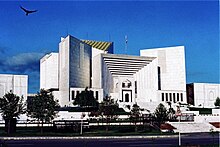Saeeduzzaman Siddiqui
Saeeduzzaman Siddiqui | |
|---|---|
| سعید الزمان صدیقی | |
 | |
| 31st Governor of Sindh | |
| In office 11 November 2016 – 11 January 2017 | |
| President | Mamnoon Hussain |
| Prime Minister | Nawaz Sharif |
| Preceded by | Ishratul Ibad Agha Siraj Durrani (Acting) |
| Succeeded by | Muhammad Zubair Umar |
| 15th Chief Justice of Pakistan | |
| In office 1 July 1999 – 26 January 2000 | |
| Appointed by | Muhammad Rafiq Tarar |
| Preceded by | Ajmal Mian |
| Succeeded by | Irshad Hasan Khan |
| 7th Chief Justice Sindh High Court | |
| In office 5 November 1990 – 21 May 1992 | |
| Preceded by | Sajjad Ali Shah |
| Succeeded by | Nasir Aslam Zahid |
| Personal details | |
| Born | 1 December 1937 |
| Died | 11 January 2017 (aged 79) Karachi, Sindh, Pakistan |
| Spouse | Ashraf Saeeduzaman Siddique |
| Children | Afnan Saeeduzzaman Siddiqui |
| Parent | Muhammad Naeem Siddique Basheer-un-nisa |
| Alma mater | University of Dhaka University of Karachi |

Saeed Uz Zaman Siddiqui (
Education
Saeeduzzaman Siddiqui was born in a middle-class, educated
Justice Siddiqui was awarded honorary membership of the Judicial fraternity of
Career
Joining the Bar and Sindh High Court
Justice Saeeduzzaman joined the Bar in February 1961. He enrolled as Advocate of High Court of West Pakistan in November 1963, and enrolled as Advocate of Supreme Court of Pakistan in November 1969). He was elected Joint Secretary of Karachi High Court Bar Association in 1967. He was elected Member of Managing Committee of Karachi High Court Bar Association for the year 1968–69. In 1977, he was elected Honorary Secretary of High Court Bar Library and continued as such until begin elevated as a
on 23 May 1992.Chief Justice of Pakistan
He was appointed the
Post-retirement
As a consequence of this, he was forced to step down from his position by the military regime. His tenure time period was shortened due to his refusal to take the Provisional Constitutional Order (PCO) Oath, prescribed by General Pervez Musharraf to legitimize the
On 25 August 2008,
Governor of Sindh
On 9 November 2016, Nawaz Sharif contacted Justice Siddiqui and asked him to accept the position of the Governor, in the wake of event which followed the dismissal of Dr. Ishratul Ibad Khan. Justice Siddiqui was sworn in as the 31st Governor of Sindh on 11 November 2016. He died in office exactly two months later.
Appointments
- Appointed Member of Election Commission of Pakistan on 9 August 1980.
- Appointed as Chairman Rule Committee of High Court of Sindh on 1 February 1986.
- Appointed Chairman Sindh Zakat Council on 13 September 1988.
- Appointed as Member of Company Law Commission on 7 June 1989.
- Appointed Acting Governor of Sindh from 27 July 1990 to 30 July 1990.
- Appointed Acting High Courtof Sindh from 19 September 1990 to 19 October 1990.
- Appointed as 15th Chief Justice of Pakistan from 1 July 1999 to 25 January 2000 was until December 2005
- Appointed Chairman of Citizens' Group on Electoral Process (CGEP)
- Member OICcontact group, also submitted a report on 'Bulgarian Muslims Social condition'
- Appointed as Governor of Sindh on 9 November 2016
Activities
- Appointed as Member of 3-men Contact Group, by Secretary-General of the , in March 1988, a second report to the 18th Islamic Conference of Foreign Ministers at Riyadh in March 1989, and the third report to the 19th Islamic Conference of Foreign Ministers at Cairo in July 1990.
- Also presented a preliminary report on the plight of Muslim minority in Bulgaria in the Extraordinary Session of Islamic Conference of Foreign Ministers in New York in October 1989. Attended the 17th, 18th, 19th and the Extraordinary Session of Islamic Conferences of Foreign Ministers in Amman, Riyadh, Cairo and New York on special invitation of Secretary-General of Organization of Islamic Conference.
- He was the Chairman of numerous organizations, some of which are The Council for Foreign Relations Economic Affairs and Law and President of the Poor Patient's Society of Pakistan. He was the Chairman of the World Bank supported Organization for Alternative Dispute Resolution (Pakistan).
- He was also the nominee judge for the International Court of Justice (ICJ) at The Hague, from Pakistan.
- On 25 August 2008, Pakistan Tehreek-i-Insaffor the Prime Minister candidate when the interim government comes into power after March 2013.
- On 9 November 2016, Mamnoon Hussain in consultation with Nawaz Sharif appointed him as the Governor of Sindh province.
Illness and death
Siddiqui contracted pneumonia and was hospitalised in early November 2016. He returned to the Governor House on 11 December 2016 and died on 11 January 2017 as a serving governor when he contracted another pneumonia on his healthy right lung. His state funeral was organised in the Governor House, making him the second person in the history of the country to receive a state funeral after Muhammad Ali Jinnah, the founder of Pakistan. He was 77.[7][8][9]
In 2018, Siddiqui was posthumously awarded the Sitara-i-Imtiaz - Pakistan's third highest civilian honour - by President Mamnoon Hussain.[10]
Siblings
He had 4 brothers and 4 sisters named
Brothers
1) Qamar uzzaman Siddique
2) Badr uzzaman Siddique
3) Khaliq uzzaman Siddique
4) Anees uzzaman Siddique
Sisters
1) Mehr-un-nisa
2) Tahira Mehmood
3) Surraya Iqbal
4) Kausar Waseem
See also
- Supreme Court of Pakistan
- Chief Justices of Pakistan
- Haziqul Khairi
- Siddiqui
- Nawaz Sharif
- Pakistan Muslim League (N)
- Provisional Constitutional Order
- List of Pakistanis
References
- ^ "عشرت العباد کی جگہ سعید الزماں صدیقی گورنر سندھ". BBC News اردو (in Urdu). BBC. 9 November 2016. Retrieved 9 November 2016.
- ^ CNN Wire: Sharif withdraws party from Pakistan ruling coalition Archived 16 September 2008 at the Wayback Machine
- ^ "South Asia – Bhutto's widower wins presidency". BBC. 6 September 2008. Retrieved 9 November 2016.
- ^ "Bhutto's Widower Wins Pakistani Presidency". The New York Times. 7 September 2008. Retrieved 9 November 2016.
- ^ "PML-N shortlists names for next president | Saach.TV". Archived from the original on 24 July 2013. Retrieved 7 August 2013.
- ^ Recorder, Business. "Will Justice Siddiqui be PML-N's presidential candidate again? – Business Recorder". brecorder.com. Retrieved 9 November 2016.
{{cite web}}:|first=has generic name (help) - ^ "Governor Sindh Saeed-u-Zaman Siddiqui passes away – The Sindh Times". The Sindh Times. 11 January 2017. Retrieved 11 January 2017.
- ^ "Sindh governor Justice (Retd) Saeeduzzaman Siddiqui passes away". 11 January 2017.
- ^ "Sindh Governor Saeed-uz-Zaman Siddiqui passes away". www.thenews.com.pk. Retrieved 11 March 2022.
- ^ "President Mamnoon confers civil awards on Yaum-i-Pakistan". Dawn. 23 March 2018.



